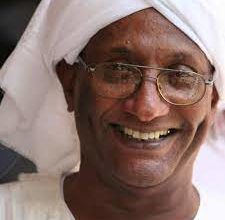*From the magazine “Ater” during the time of war on the network* *Polo Valéry at a shelter for displaced people in the city of Kosti (1-2)*

*By Abdullah Ali Ibrahim*
It has been said that truth is the early casualty of war. Imagine the plight of truth in a war like the one in Sudan, which is waged more in social media than on the battlefield. This makes the weekly online magazine “Ater” (Impact), which is nearing the end of its second year of publication, especially welcome. It is run by Aref Al-Sawi, one of the distinguished journalists deeply concerned with the professionalism of journalism, along with a group of young journalists known for their sobriety and thorough investigation. “Ater” stands apart from other online newspapers by mobilizing correspondents in Sudanese cities, not only making them eyewitnesses to the war they report on, but also giving the victims a voice to speak for themselves and about what is happening around them. In doing so, “Ater” has achieved something that the Sudanese press, even before the war, failed to do for a long time. These newspapers had abandoned their network of correspondents entirely, ending up with stories penned by their editors, and an abundance of opinion columns, turning the newspapers into an elitist salon or a basement where a narrow circle of debate centered around its own contentious policies, disconnected from all other politics. “Ater” brings what James Hunter, author of “Democracy and Solidarity,” advocated: the critical importance of discovering the human being beneath the abstractions of our symbolic, inflamed politics.
There’s a Sudanese proverb that says, “He who knows the bread in the yarn market,” describing a person’s insignificance among others. However, “Ater” introduced us to a woman named Safa in the “Tea Sellers” market in Merowe, a city in Northern State that has taken in displaced people from Khartoum and Madani. The market was limited in scope until the displaced arrived, and the women among them started selling tea on the city’s streets. Journalist Hassan Al-Nasir reported that these women changed the face and smell of the city: “You can smell the mud produced by them sprinkling water on the ground at their workplaces and the fragrant incense (from their incense burners).” Safa had fled from Khartoum to the city of Madani, the capital of Al Jazirah State. She described their departure by saying, “We left with nothing,” meaning they were stripped of everything. She said, “Life in Madani was easy and pleasant,” and it was a stone’s throw from Khartoum, to which they would inevitably return. But when the Rapid Support Forces occupied Madani, they left it. She thought about fleeing to Egypt for refuge, but her financial situation prevented her from doing so. She also considered seeking refuge in Juba, the capital of South Sudan, encouraged by friends who told her that livelihood opportunities were available there, in selling clothes, food, and beauty salons. However, she chose to come to Merowe, accompanied by a family she had met in Madani. She described her situation in Merowe as “stable and good,” except if the Rapid Support Forces were to come for the third time. And if they did, she said, “we would jump into the river.”
Sari Naqd, Mohamed Hussein, Wafaa Abdel Azim, and Hassan Al-Nasir wrote four journalistic stories titled “Between Nature’s Deceit and the Deceit of War” about the unprecedented disasters caused by the autumn of 2024 in areas under government control and among the displaced who had fled to them from areas occupied by the Rapid Support Forces. These disasters claimed 29 lives, injured 125 people, and affected 167,000 whose homes were destroyed, and businesses were flooded, displacing 30,000 as a result. The floods knocked out three power generation stations in Port Sudan, the temporary administrative capital, and submerged the tents of displaced people in Kassala (253,000) and Al-Qadarif (755,000), cutting off the Port Sudan-Atbara road, which is the main commercial transport artery for Sudan.
What Sari, Wafaa, Mohamed, and Al-Nasir wrote was not the usual “Oh, the tragedy!” that often floods war reports in social media. They are among those who, as the foreigners say, when waves crash, their shoulders remain above the water if we wanted to make it a rhetorical joke. These disasters were not caused by the war but were triggered by pre-existing conditions. In Nile River State and Northern State, some people planted their crops in the fertile delta of streams that nature had created for diverting floodwaters away from inhabited areas. What is even more dangerous is that these streams became blocked due to the unregulated mining operations, as gold became the country’s top national product. These streams are ideal for gold mining because the veins appear along their edges. The excavation for gold resulted in piles of soil, known as “karta” in their language, which obstructed the natural flow of water, forcing it to disperse over people’s homes and fields, flooding them. This is not the end of the pain. This karta is saturated with chemicals like mercury and cyanide, which are used by miners to extract gold from the surrounding soil and rock. The floodwaters carry this pollution to people and their livestock. It is heartbreaking that the state did not respond to the long-standing protests of the people against this environmentally destructive economic activity. They complained about the death of their livestock due to this, as well as deformities in fetuses, and an increase in cases of miscarriage. Yet the state did nothing.
The story concluded that urban and non-urban planning did not consider the paths of these streams in housing plans. The government distributed land in areas threatened by floods without hesitation. They did not heed the wise words of an affected individual, quoted by the journalists: “Water is water, whether it falls in small or large amounts, and streams never lose their way.” But these streams lost their way due to human interference.
To be continued…



